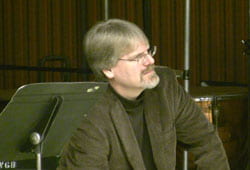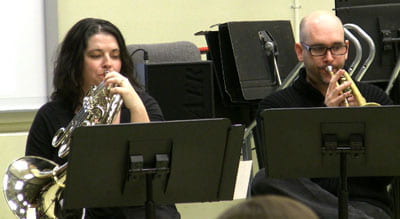Jazz History course exemplifies 360° of Learning at UW-Green Bay
 If a performance from a local jazz group isn’t your idea of a typical university class hour — well, this isn’t your typical university class.
If a performance from a local jazz group isn’t your idea of a typical university class hour — well, this isn’t your typical university class.
[youtube id= JFDynmjOFNM width= 400 height= 225]
It’s a team-taught course that exemplifies the ideals of UW-Green Bay’s 360° of Learning approach, drawing on a variety of academic disciplines to enhance students’ education with learning from multiple perspectives. In this class, the Jazz Age, it combines the expertise of Associate History Professor Clifton Ganyard with the music and performance knowledge of fellow faculty member, Associate Music Prof. Adam Gaines.
And today, it means live jazz — connecting the students with the material as only a performance can.
“Live music is a completely different experience,” Gaines said. “So we wanted to give students a chance to interact with me and the rest of the musicians in Gypsy Trip, and understand from our perspective a little bit what we were doing.”
 Students in the class are primarily History and Music majors — with a few studying English and a jazz-playing Physics student thrown in for good measure.
Students in the class are primarily History and Music majors — with a few studying English and a jazz-playing Physics student thrown in for good measure.
For professors and students alike, it’s the perfect fusion of Music and History — a richer experience than focusing on a single discipline alone.
“It kind of started along with the birth of this group, of Gypsy Trip, and we’re all friends and we started hanging out,” Ganyard said. “And some of them, I think, were surprised that me as a historian was interested in jazz. And we started talking about it and it occurred to us that — because Adam teaches a regular course on the history of jazz — that we should do something special together and collaborate.”
 Ganyard and Gaines hope to offer their co-taught class again, noting both how much the students are learning — but also how much they’ve learned from each other.
Ganyard and Gaines hope to offer their co-taught class again, noting both how much the students are learning — but also how much they’ve learned from each other.
The chance to do so, they say, is invaluable.
“It’s one of the greatest things about this campus, really — the 360° of Learning is exactly what we’re about here,” Gaines said. “And this class is sort of a microcosm of that — it’s really good for that because we’re trying to talk about music and jazz, not just from the perspective of the technical aspects of how music works. A more music-specific course may do something like that and we certainly do that in Music discipline. But you know, again, Clif has a different perspective, a historical perspective.
“Even though I know the music really well, to suddenly get that sort of perspective that he has — it’s great for the students; it’s great for me too.”





